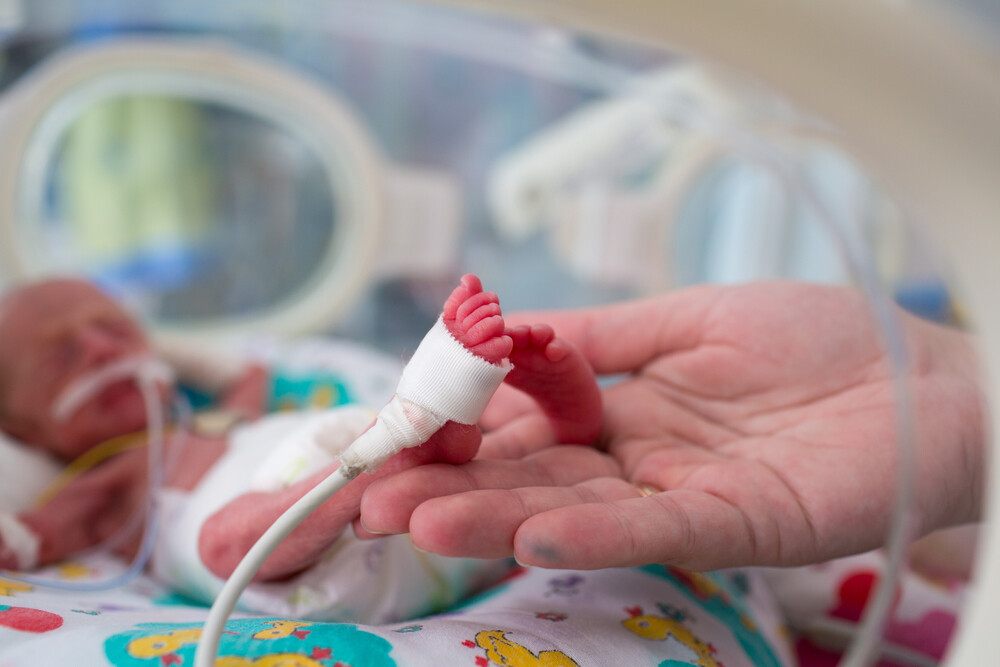Today, premature babies usually have good chances of survival and are affected by fewer and fewer complications. Parents can still actively promote the development of their baby in the clinic.
Actually it would have been many more weeks until the calculated date of birth. But suddenly the baby is there – much too early. More than 380,000 babies are born preterm in the U.S. each year before the 37th week of pregnancy and are therefore considered premature babies. We have collected answers to the most important questions.
What are the gradations of preterm birth?
Babies that are born from the 34th week of pregnancy onwards are called late premature babies by doctors. Between the end of the 32nd and 34th week of pregnancy, they speak of moderate premature births. Very premature babies are born between the 28th and 32nd week of pregnancy and weigh on average no more than 1500 grams. Extremely immature premature babies are born before the 28th week of pregnancy. They only weigh up to 1000 grams.
What are the chances of survival for premature babies?
“Of the children born very early, between the 28th and 32nd week of pregnancy, almost 100 percent survive,” says Professor Matthias Keller, Chief Physician of the Children’s Hospital Dritter Orden in Passau. With each week less in the womb, the risk of a baby dying increases. At 24 weeks of pregnancy, the probability of survival is still around 75 to 90 percent. “In the area of the 22nd and 23rd week of pregnancy the limit of viability is reached,” says Matthias Keller. In a database, the University of Iowa collects reports of particularly small babies that have survived. According to these reports, the lightest premature baby in the world, born in San Diego (USA) in 2018, weighed just 245 grams.
What are the causes of preterm birth?
Infections and diseases of the mother play a major role, such as pregnancy poisoning. In other cases, diseases or malformations of the child trigger premature birth. A multiple pregnancy and genetic causes also make premature delivery more likely. Matthias Keller emphasizes: “Ultimately, premature birth can only rarely be prevented by the mother’s behavior”. However, she should take advantage of preventive medical check-ups so that risks can be detected early and treated if necessary.
How is a premature birth announced?
If premature contractions occur or the amniotic sac bursts, pregnant women should consult a doctor immediately. In a specialised hospital, gynaecologists try to prolong the pregnancy.
What happens after the premature birth?
While still in the delivery room, doctors and nurses stabilise breathing and circulation. Then the child is taken to the intensive care unit for newborns (neonatology). “The first hour is crucial for the prognosis of the child,” explains Matthias Keller. Hospitals differ in their experience and equipment. Mothers with an increased risk of premature birth should therefore inform themselves in good time about the clinics in their area, advises Matthias Keller.
What can parents do?
Foster the bond between you and your child – through intensive skin contact: With the so-called kangaroo, the newborn lies on the bare breast of mother or father, if possible already in the delivery room. In this way parents support the development of their child. “We also train the parents to give the premature baby food, change its nappy or bathe it,” says Matthias Keller. “They should get a feeling for their child.”
With the support of a midwife or the nursing staff, mothers can also try to breastfeed or express breast milk. “Breast milk protects against various diseases such as lung and eye problems or intestinal inflammation, for which premature babies have an increased risk,” explains Professor Wolfgang Göpel, neonatologist and senior consultant at the Children’s Hospital of the University Medical Center Schleswig-Holstein.
What other risks do premature babies have?
In addition to respiratory disorders, cerebral haemorrhages are one of the dreaded complications, especially in very small premature babies. For various reasons, this can lead to bleeding into the brain. They are often mild in nature, but sometimes they can be severe and in the worst cases lead to disabilities. “Overall, however, more and more premature babies survive without complications,” says Wolfgang Göpel.
How do premature babies develop?
“Well over half of them do not differ from other children at school age,” reports Wolfgang Göpel. He heads the study of a research association of more than 50 hospitals in Germany, for which about 3000 once very small premature babies at the age of five years have already been examined. “In the intelligence test, they scored slightly worse than their peers on average, probably due to complications such as cerebral haemorrhages,” reports Wolfgang Göpel. The premature babies also lost their breath more quickly, suffered more frequently from inflammation of the respiratory tract and were somewhat smaller and more delicate than other five-year-olds. The researchers’ goal is now to use genetic analyses, among other things, to predict more precisely which premature babies might have specific problems – in order to provide them with more targeted support in the first days of their lives.

